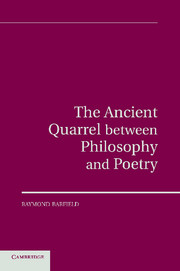Book contents
- Frontmatter
- Contents
- Acknowledgments
- Introduction
- 1 Socrates, Plato, and the Invention of the Ancient Quarrel
- 2 Aristotle, Poetry, and Ethics
- 3 Plotinus, Augustine, and Strange Sweetness
- 4 Boethius, Dionysius, and the Forms
- 5 Thomas and Some Thomists
- 6 Vico's New Science
- 7 Kant and His Students on the Genius of Nature
- 8 Hegel and the Owl of Minerva
- 9 Kierkegaard: A Poet, Alas
- 10 Dilthey: Poetry and the Escape from Metaphysics
- 11 Nietzsche, Heidegger, and the Saving Power of Poetry
- 12 Mikhail Bakhtin and Novelistic Consciousness
- Index
- References
11 - Nietzsche, Heidegger, and the Saving Power of Poetry
Published online by Cambridge University Press: 03 May 2011
- Frontmatter
- Contents
- Acknowledgments
- Introduction
- 1 Socrates, Plato, and the Invention of the Ancient Quarrel
- 2 Aristotle, Poetry, and Ethics
- 3 Plotinus, Augustine, and Strange Sweetness
- 4 Boethius, Dionysius, and the Forms
- 5 Thomas and Some Thomists
- 6 Vico's New Science
- 7 Kant and His Students on the Genius of Nature
- 8 Hegel and the Owl of Minerva
- 9 Kierkegaard: A Poet, Alas
- 10 Dilthey: Poetry and the Escape from Metaphysics
- 11 Nietzsche, Heidegger, and the Saving Power of Poetry
- 12 Mikhail Bakhtin and Novelistic Consciousness
- Index
- References
Summary
More than two millennia after the start of the quarrel, Friedrich Nietzsche revisited the idea that the deity speaking to a poet – in this case, Euripides – might in fact be a demon, but a demon of a particular sort who was responsible for wrecking Greek tragedy, with catastrophic consequences for those who followed. “Dionysius had already been scared from the tragic stage by a demonic power speaking through Euripides,” he says in The Birth of Tragedy. “Even Euripides was, in a sense, only a mask: the deity that spoke to him was neither Dionysius nor Apollo, but an altogether newborn demon, called Socrates.”
Whenever something is apparently gained, it is fair to ask the cost, and this is what Nietzsche does. To achieve the gains made through dialectic, through the addition of the philosophical question to the tools available to the human mind, what was the loss? For Nietzsche what is lost is a kind of metaphysical comfort that tragedy reveals to us and reminds us of, the comfort that, whatever may happen with appearance, life finally remains a powerful presence that outlives all individuals, all nations (Birth, 59). Nietzsche is vehement in his criticism of the forces that resulted in this loss. When we assert that our temporary states of pleasure and pain and our own existences somehow rightly lay claim to eternal importance, we disfigure the very pleasure and pain experienced, twisting the experiences into a mangle of misplaced heights and valleys.
- Type
- Chapter
- Information
- The Ancient Quarrel Between Philosophy and Poetry , pp. 226 - 253Publisher: Cambridge University PressPrint publication year: 2011

